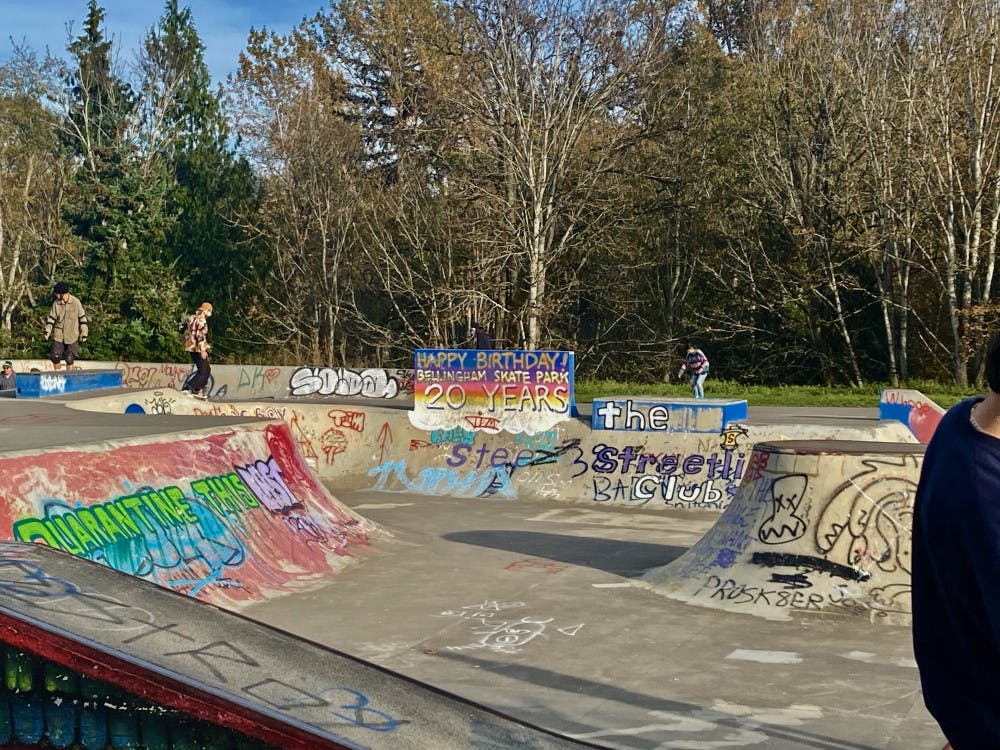Bellingham’s skaters can’t see a future without a board

By Olivia Hicks
Skateboarding, in Bellingham and globally, has broken out of a subculture and become mainstream.
Zac Garza, owner of Unknown Board Shop in Bellingham, described skateboarding when he was growing up in the late 1980s as an artistic outlet for outsiders like him.
“It’s like an artform or dancing, but more aggressive,” Garza said. “When I was growing up I was a little bit socially awkward, but skateboarding did the talking. We were in our own little cultural group; if you weren't a skateboarder, people would look at us like we were odd.”
However, skateboarders aren’t necessarily outsiders anymore, Garza said. As some professional skateboarders are offered brand deals, modeling contracts and featured in magazines like Vogue, skateboarding has become more mainstream.
This shift has created more representation for skaters of color and women skaters, said Becky Beal, skateboarding culture and politics researcher at California State University East Bay.
“Primarily, there is a white male subculture to skateboarding,” Beal said. “Now, diversity is broad. I’ve talked to quite a few skaters who are not white or male, and they said that they have been around in skateboarding from day one, they just haven’t gotten representation.”
However, not everyone in the skating community is accepting of skateboarding becoming less niche, Beal said.
“There's a tension between the fact that it's becoming more mainstream and more diverse and inclusive,” Beal said. “I think a lot of the old school skaters don't like it because they're losing their distinction and control of [skate] culture.”
At the Bellingham skatepark, it is common for women and girls to be outnumbered by men and boys, said Bek Jensen, a fourth-year Western student.
“Bellingham does have a solid group of girls that commonly skate at the park, me being one of them, but on the average day there is probably a 1-7 ratio of girls to guys,” Jensen said. “This is not something that bothers me personally. I have always been more immersed with guys in sports or activities than girls, but I do know that many girls at the park appreciate the girl-to-girl interaction while skating.”
Jensen started skating when she was 8 years old. She returned her Barbie doll Christmas present for a skateboard. The activity has now become part of her everyday life.
“I happen to be somebody that comes here pretty much every day, if it's not raining. So, I know almost every person at this park,” Jensen said.
Women skateboarders have made waves in skate culture in the past two decades, Beal said. While resources have always been available for women, they have not been publicized. Now, Beal said skateboarding organizations who promote inclusivity have become more outspoken.
Mainstream skateboarding culture has changed representation as well as public opinion of skateboarders.
Beal recently finished a three-year study of non-skateboarding adults' opinions on skateboarding in their communities. Beal said the shift in public opinion was shocking.
“Adults who don't skateboard see the value of skateboarding and want to help promote it,” Beal said.
This is surprising because of skaters’ historical trend of resisting the norm, Beal said. Skateboarding, surfing and other board sports depend on extensive leisure time, which counteracts the ideals of the capitalist workday, according to Beal.
This trend of defying norms, specifically traditional masculinity, makes skateboarding a creative and inclusive outlet, Beal said.
“I felt like skateboarding embraced the opposite of jock culture: noncompetitive support for each other and expressing yourself artistically,” Beal said. “I think that's part of the culture that draws people to it, its individual expression.”
Justin Ritter, a third-year Western student, said the skating scene in Bellingham does just that: It promotes individuality rather than blending into the crowd.
“Everyone appreciates that each person is super different,” Ritter said.
Bellingham skaters, like Jensen, recognize the importance of the skateboarding subculture in Bellingham. Jensen said Bellingham would be a bleak place without the skateboarding community.
“I think the Bellingham skatepark is a really cool place because it's really big and it brings a lot of people in,” Jensen said. “It just has a lot of culture in it. Bellingham would be nothing without it.”





